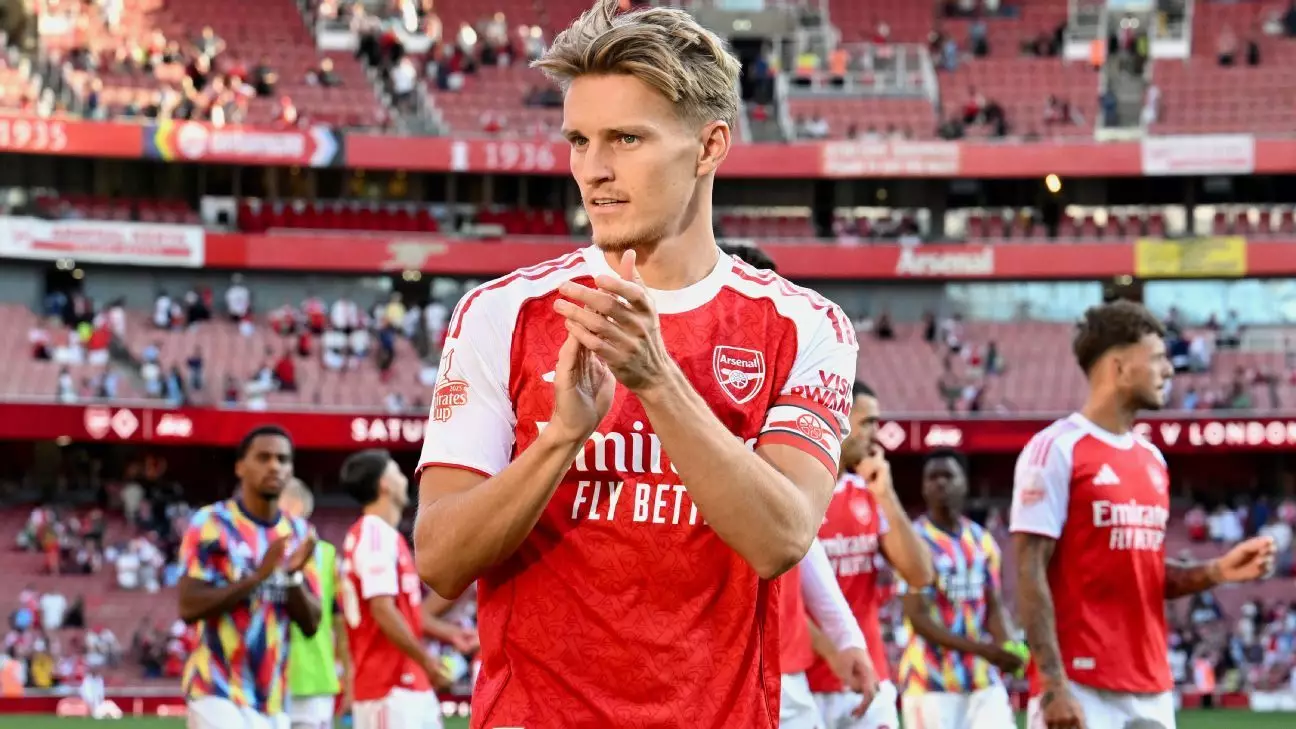In the ever-evolving landscape of Premier League football, strategic leadership is paramount. Mikel Arteta’s unwavering support for Martin Ødegaard as Arsenal’s captain exemplifies a bold stance rooted in trust, data, and team cohesion. Despite vocal criticisms from former Arsenal captain Tony Adams, who argued that Ødegaard is not the right figure to lead Arsenal to a Premier League title, Arteta remains resolute. His decision, backed by player voting and staff consensus, signals a deeper understanding of what true leadership entails beyond legacy or opinion.
Far from dismissing the importance of experience, Arteta’s emphasis lies in authenticity and peer recognition. The captaincy, he argues, should be a reflection of how players genuinely perceive their leader—not an arbitrary choice based on reputation or seniority. His transparency in sharing that the squad overwhelmingly voted for Ødegaard underscores a fundamental truth: effective leadership is rooted in trust, respect, and the confidence of one’s peers. To dismiss this consensus would be to ignore the voices of those who actually perform on the pitch, an essential but often overlooked aspect of leadership debates.
Arteta’s approach champions a culture where decisions are driven by collective input rather than external opinions. His emphasis on the players’ feelings about who should lead reveals that team chemistry and mutual respect are the cornerstones of sustainable success. Such a stance isn’t merely pragmatic — it’s aspirational. It reinforces a broader philosophy that leadership must align with the psychological and emotional dynamics of a squad, which in turn fuels performance and unity. This stands in stark contrast to traditional authoritarian views that prioritize hierarchy over harmony.
Leadership Beyond the Armband: A Holistic Perspective
While some critics, like Adams, may argue that Ødegaard lacks the qualities to steer Arsenal to a championship, Arteta’s broader perspective highlights the multifaceted nature of effective leadership. It’s less about individual charisma and more about inspiring confidence in teammates and creating an environment conducive to collective excellence. Arteta’s comments hint at the importance of day-to-day influence, support, and the capacity to rally teammates in pressure moments — qualities that cannot always be captured by a single persona or public perception.
This belief in inclusive leadership fosters an environment where players can flourish without the shadows of unnecessary doubt or second-guessing. It’s a recognition that leadership is dynamic and that leaders must be chosen based on their ability to connect authentically with their team, rather than solely on reputation or experience. Such a perspective challenges the conventional hierarchy and encourages managers to prioritize squad chemistry when making pivotal decisions.
Moreover, Arteta’s stance sends a powerful message about the importance of internal validation over external opinion. This attitude promotes resilience within the squad, emphasizing that true authority must be earned through credibility and consistent performance. It’s a quiet affirmation that trust, once established, can be far more potent than any external validation or the imposition of traditional notions of leadership.
Adapting to the Modern Game: Rule Changes and Discipline
Beyond leadership candidacy, Arteta’s comments reveal a nuanced understanding of the procedural intricacies that influence game outcomes. His concerns about recent rule changes — especially regarding time-wasting — demonstrate a strategic mindset focused on adapting to evolving league standards. While officials attempted to crack down on delays last season, inconsistent enforcement created confusion and frustration among teams.
Arteta’s proactive approach to safeguarding Arsenal against potential pitfalls indicates a commitment to maintaining discipline and focus throughout a demanding season. By advocating for clear and consistent refereeing, he underscores a broader truth: the best teams are those that adapt swiftly and operate with discipline within the rules. It’s an acknowledgment that winning titles isn’t merely about talent and tactics but also about discipline, mental resilience, and understanding the finer details of league regulations.
His optimism about the league’s continuous improvement hints at a forward-looking mindset. Arteta believes that structured communication between managers and officials can foster a fairer, more competitive environment — one where football truly reflects its elite status. This perspective highlights that leadership extends beyond the pitch into every facet of the game’s ecosystem, including its governance.
The Power of Belief and Confidence in the Face of Criticism
In defending Ødegaard’s captaincy, Arteta not only champions a specific player but also reinforces his philosophy of unwavering confidence in his judgment and vision. His willingness to withstand external criticism exemplifies a leadership style rooted in conviction and resilience. Instead of succumbing to pressure, he demonstrates that belief in his decision-making process is fundamental to maintaining team stability and morale.
This stance encourages other managers and coaches to trust their instincts and engage in transparent communication, especially amid criticism. Arteta’s openness about the voting process and his rationale fosters accountability and trust, qualities essential for leading a high-pressure environment like top-flight football. His confidence sends a message that success is built on conviction, collective endorsement, and the readiness to defend choices that serve the long-term interests of the team.
In rejecting external narratives that question his leadership, Arteta exemplifies how strong conviction can fortify a team’s internal unity. Such confidence can inspire players, staff, and supporters, transforming challenges into opportunities for growth. His stance signals that true leadership involves standing firm amid criticism, using it as a catalyst rather than a hindrance on the road to victory.
—
By oscillating between trust in collective decision-making, strategic adaptation, and resilient conviction, Arteta offers a blueprint for modern football leadership. His unwavering support for Ødegaard, grounded in team consensus, highlights a shift toward values that prioritize cohesion, authenticity, and long-term vision — qualities that may be the unseen difference-maker in Arsenal’s pursuit of glory.

